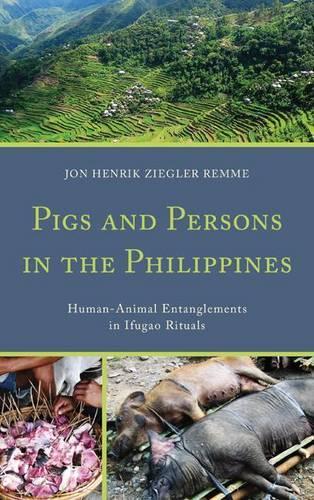
Pigs and Persons in the Philippines: Human-Animal Entanglements in Ifugao Rituals
(Hardback)
Publishing Details
Pigs and Persons in the Philippines: Human-Animal Entanglements in Ifugao Rituals
By (Author) Jon Henrik Ziegler Remme
Bloomsbury Publishing PLC
Lexington Books
29th May 2014
United States
Classifications
Tertiary Education
Non Fiction
Indigenous peoples: religions, belief systems, cultural worldviews and spiritual
390.0899921
Physical Properties
Hardback
166
Width 161mm, Height 236mm, Spine 19mm
399g
Description
The Ifugao of Northern Luzon, the Philippines, are famous for their extensive system of irrigated rice terraces, and previous anthropological accounts of the Ifugao have stressed their immense importance for social life. This book attempts to "go against the grain" and approach Ifugao society through an often overlooked element, namely their pigs. By a detailed ethnographic description of Ifugao cultural practices related to kinship, animism, prestige, and death, Pigs and Persons in the Philippines shows how pigs are involved in the constitution and re-constitution of relations between humans and between humans and spirits. Remme draws upon theories of relationality, performativity, and assemblages to argue that the exchange and consumption of pig meat have the ontological effect of enacting persons. He also shows how pigs are the prime means of engaging in relations with spirits and argues further that prestige can be understood as a heterogeneous assemblage of relations of which pigs play a central role. While pigs are thus constitutively involved in the enactment of persons, Remme also shows how they are operative in the re-constitution of relations that occurs at death. In documenting these practices, Remme argues for a relational understanding of personhood that goes beyond inter-human relations and includes relations with nonhuman beings, including spirits, and animals.
Reviews
The book is nicely written. Certainly, it is a product of scholarly work, with a solid theoretical and historical backdrop. Anthropologists will find this book useful, particularly on the theoretical discussions of social differentiation. * Anthropos *
This compelling contribution to the anthropological literature adds both ethnographic granularity and theoretical depth to studies of the Ifugao. . . .He persuasively argues throughout this engaging and skillfully researched work. . . .Within this evolving branch of the discipline, the complexities and contradictions underlying the interpenetrative linkages between humans and animals are laid bare in a way that has previously not received much in the way of scholarly attention . . . It is within this context that the relational personhood Remme examines among the Ifugao assumes particular significance. * American Ethnologist *
Jon Henrik Remmes book is fascinating both in terms of the ethnographic material he presents on the human relationship with pigs among the Ifugaosomething which merits much more attention throughout SE Asia, where pigs are widely of considerable nutritional, social, and cosmological significanceand in terms of his focus on the ways in which pigs and humans are entangled, are part of each other and constitute each other. He draws on the relational philosophy of Deleuze and Guattari in his focus on the way in which pigs are involved in human becoming,' as well as drawing on recent multi-species anthropology. I found his extension of both analytical approaches into what he describes as their 'dark' sidesprompted, as he says, by the punctuation of his fieldwork by the screams of dying pigsinteresting and thought-provoking in relation to its implications for understanding the boundaries of living beings, both spatially and temporally, in the context of a relational approach to understanding the meaning of 'being a being.' -- Monica Janowski, University of London
Pigs and Persons in the Philippines is a treasure trove of ethnographically nuanced and theoretically sophisticated analysis. Through an innovative re-reading of the Ifugao through their pigs, Remme makes an original and powerful contribution to the ethnography of Southeast Asia and the anthropology of personhood and sociality. The book traces the intricate ways in which domesticated pigs mediate Ifugao relations with human and non-human consociates across the spheres of kinship, ritual, and politics. Through lively and engaging prose it vividly evokes the concrete processes whereby Ifugao selves and society are constituted through exchange of pigs, and makes a compelling case for how kinship and spirit relations are constructed through the practices through which they are enacted. -- Kenneth Sillander, University of Helsinki
An avid and marvelously thorough account of human and porcine entanglements in Batad, Ifugao. -- Harold C. Conklin, Yale University
Author Bio
Jon Henrik Ziegler Remme is post-doctoral research fellow at the Department of Social Anthropology at University of Oslo. Remme has published articles on a number of themes including animism, ontology, causality, and interreligious burial rituals.
